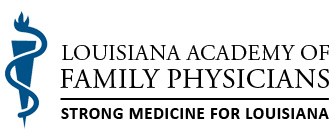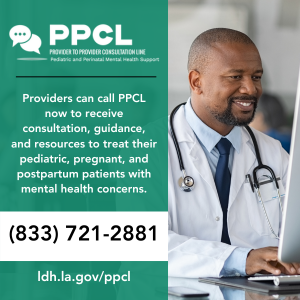The Louisiana Department of Health is releasing the 2020 Pregnancy-Associated Mortality Review Annual Report, which provides crucial insights into causes and disparities of deaths among women within a year of pregnancy in Louisiana. The report also identifies actions that can be taken by health systems, policymakers, and communities to prevent deaths and life-threatening complications in the future.
Key findings in the report include:
- There were 82 pregnancy-associated deaths identified in 2020. Pregnancy-associated deaths are defined as occurring within a year of pregnancy regardless of the cause. The majority of deaths (78%) were pregnancy-associated, but not related to the pregnancy.
- The top causes of pregnancy-related deaths were cardiomyopathy, accidental overdose, infection, and cardiovascular conditions.
- The top causes of pregnancy-associated, but not related deaths were accidental overdose, homicide, and motor vehicle collision.
- Accidental overdose was the leading cause of pregnancy-associated deaths. Thirty-four percent (29 deaths) of all pregnancy-associated deaths were due to accidental overdose.
- Racial disparities exist. Thirty-seven percent of all births in Louisiana in 2020 were among non-Hispanic Black women, but non-Hispanic Black women accounted for 62% of all pregnancy-associated deaths.
- Many deaths were potentially preventable. The review of each death determined that 93% of pregnancy-related deaths and 81% of pregnancy-associated, but not related deaths were potentially preventable.
This is a report that prioritizes detailed in-depth reviews of each pregnancy-associated death in Louisiana. Surveillance using vital statistics can capture general trends and disparities in a more timely way, but it is widely recognized that state and local maternal mortality review committees are best positioned to perform comprehensive assessments of pregnancy-associated deaths and identify opportunities for prevention.
"My team has been hard at work developing specific short- and longer-term goals to address maternal and infant morbidity and mortality in Louisiana," said LDH Secretary Dr. Ralph Abraham. "This is a top policy priority at LDH, and this report is a substantial starting point for further discussion and collaboration with birthing facilities, the healthcare sector and the public at large. We look forward to moving the needle together on this important health issue."
In the United States, maternal mortality is higher than any other high-income country and significant racial disparities exist. The same is true in Louisiana. The Louisiana Pregnancy-Associated Mortality Review (PAMR), an initiative of the Louisiana Commission on Perinatal Care and Prevention of Infant Mortality, contributes to the body of research that identifies the areas of prevention needed to ensure safe, dignified births and avert preventable outcomes. The report provides a detailed picture of maternal mortality in Louisiana throughout 2020.
"Examining the causes of maternal mortality is a crucial step in changing our maternal outcomes. The Pregnancy-Associated Mortality Review Committee dedicates time to both determine causes of death and identify areas to focus on prevention, said Dr. Veronica Gillispie-Bell, Medical Director of the Louisiana Perinatal Quality Collaborative and Pregnancy Associated Mortality review. “We are grateful to the multidisciplinary team that participates in this process. The work they have completed will inform policy decisions that seek to end maternal deaths in our state."
The report drives data to action with recommendations urging policymakers, healthcare providers and the public to recognize the urgent need to improve the health of Louisiana’s mothers, including recommendations for:
- Addressing racial and cultural bias across the network of care that serves pregnant and postpartum women
- Identifying and addressing social determinants of health
- Improving provider screening and assessments for substance use disorder, perinatal and postpartum mood and anxiety disorders, intimate partner violence and social determinants of health
- Improving patient and family-centered care
- Improving care coordination before, during and after pregnancy, including support for continued healthcare during the fourth trimester, or the first 12 weeks after birth
- Increasing and improving harm reduction strategies
- Improving implementation of evidence-based guidelines for treating leading causes of pregnancy-associated deaths
Access the full report and learn more about our ongoing efforts at partnersforfamilyhealth.org/maternalmortality.


